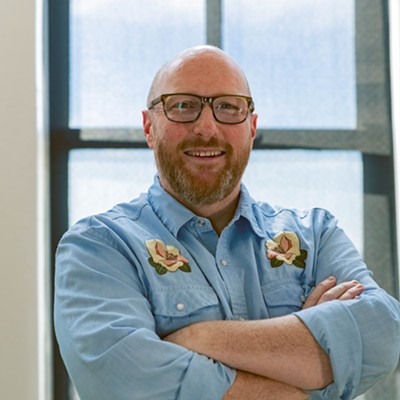If there were a String Band Hero video game, it's highly likely the music of Nashville's Old Crow Medicine Show would be prominent in the list of song options. Best known for "Wagon Wheel," the song that's as responsible for today's youthful lust for all things banjo as any other single track, the band took an abrupt break in 2011 amid a line-up change. With Carry Me Back, the former buskers sound as good as they have since their self-titled breakthrough album in 2004.
Christopher "Critter" Fuqua, a founding member of the band, left in 2007 and came back just before the album's release earlier this year to resume his duties on vocals, banjo and guitar. Since the band is hitting House of Blues tonight, we spoke with "Critter" about attending college in Texas, staying sober and how Bob Dylan is so very Bob Dylan.
You grew up in Virginia and the band is based in Nashville. How did you end up attending Schreiner University in Kerrville? To get sober, I moved to Kerrville for treatment, and after that, I decided to stay and study at the university there. I have family in San Antonio and I was born in Austin, so I've been going to Texas a lot over the years, even though I grew up in Virginia. I guess I can claim duel citizenship.
How has your sobriety gone since rejoining the band? I'm totally sober now and I'm really happy, so I'm glad I did what I did to get this way.
The way things sounded in 2011 when the band abruptly announced its hiatus wasn't good. So, it was a surprise to see the band back together and a new album out in 2012. Yeah. I was still in school when they took the break. Since that was before I came back, I didn't have much participation in the recording of this album since it had been largely recorded before the hiatus. I was able to help out with the recording for a few days when I rejoined them though. As far as the hiatus is concerned, everyone took about a year off from the band.
So, a year was all it took for the band to feel good about being together again? Yes. Everything's different now, but in a great way. We've got some new blood in the band [fiddle player Chance McCoy], and it's now a new experience for each of us.
You and some other band members have said that your song "Wagon Wheel" is more well-known than the band itself is. That's a strange dynamic, isn't it? Well, that song has taken on a life of its own. It's not a radio hit-single, so it's grown in a way that a great folk song should grow. It's a gold record now, just from downloads, but it's never been on MTV or anything like that. It's been spread by word of mouth and when people play it in pickin' circles. It's evolved in a natural way.
That song has been called a "modern folk classic" by some. That term seems a bit odd and contradictory for a song with such an old-timey feel. Folk is a generic, blanket term, and at one time, a song that we now consider to be an old song was a brand-new hit of the day. The songs we're playing, in the grand scheme of things, are rooted in a spirit of community, just like those old songs that have been passed down for years.
Bob Dylan is a co-writer of "Wagon Wheel" with your bandmate Ketch Secor, and you've been quoted as saying you "sold your punk records to buy Bob Dylan records." Why is his music such a gateway for young people from rock and punk to older forms of music? He's a link to Woody Guthrie, who's a ink to an even earlier form of American music history. He's still making great albums, too. Bob Dylan's a great doorway for all sorts of artists because he's not just folk, or just rock. He's very much Bob Dylan. I think bands like us, Mumford and Sons, and Gillian Welch and David Rawlings are sort of doing what he has done before, in that we take our own experiences and observations and put them into songs made of traditional, American roots form. That form is still a great vehicle for songs, whether the song is about love, the Iraq War or anything else.
Do you as a songwriter or performer ever feel boxed-in by the traditional roots form of music? I don't think it confines us in any way. I think of us as a link in a chain that also consists of links from the Irish and English fiddles and ballads, and the banjos and rhythm from the African Americans. The same chain also has links that go from bluegrass to the blues to even Elvis Presley. There's the same passion, desire and subject matter that we would have, even if we were playing with electric guitars.











